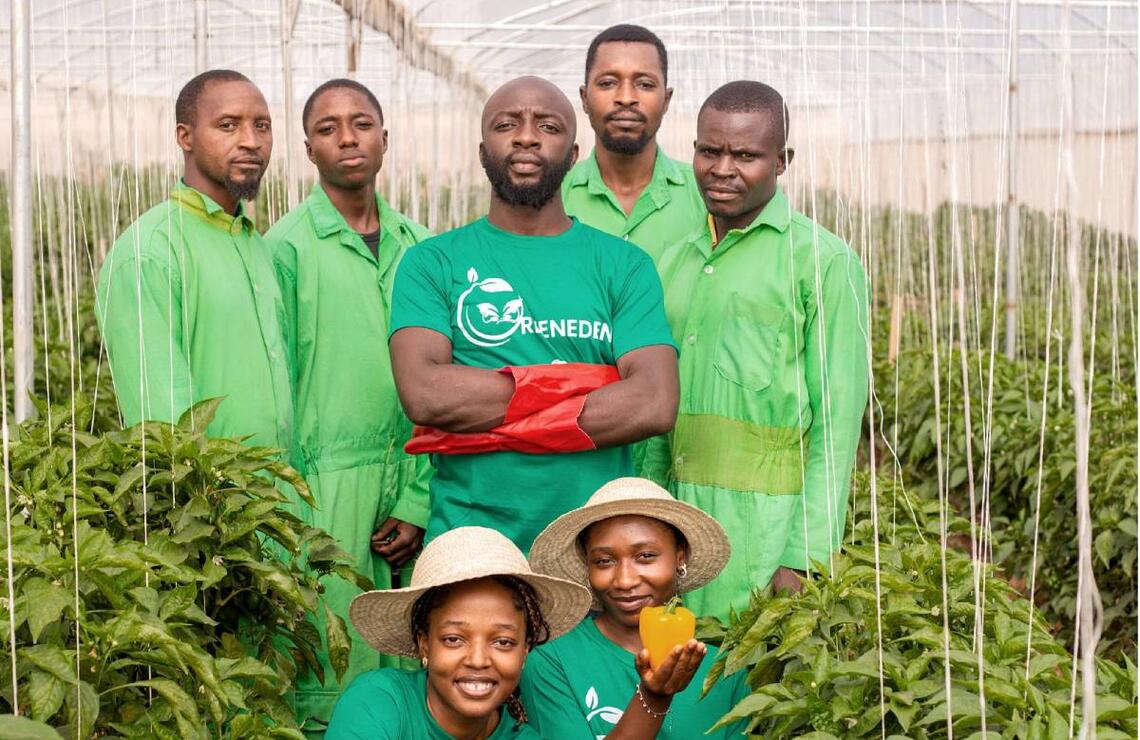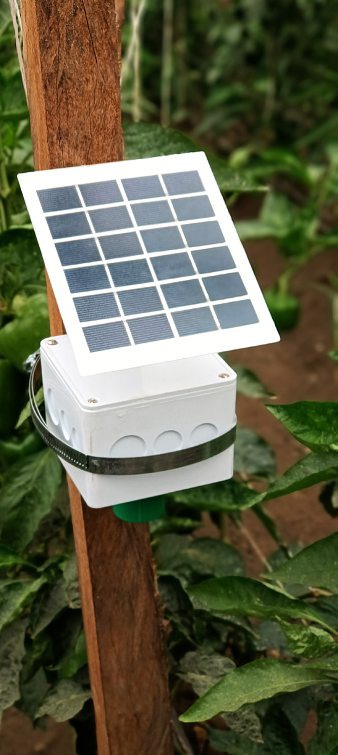
For state-of-the-art agriculture
Employing 35% of the population, agriculture features high on the President's list of priorities. The sector is striving to modernise, not only by investing in technology, but also through the use of GMOs, which some are opposed to, in order to better adapt to natural conditions.
Maria and Blessing, with mechanical but precise movements, peel the husks off the cobs of maize spread out in front of them. It's harvest time. Every day since the end of October, they and over a hundred other farm workers have been travelling to Foburg, a 22-hectare farm run by Green Eden Farms, around thirty kilometres from the town of Jos. Sitting side by side, the two women are warmly dressed. There's a cool breeze blowing down from the neighbouring hills in this eastern part of Plateau State, which borders on Bauchi.
Theophilus Maimako, the founder of the start-up, is leading by example. With his red cap on his head, black tracksuit and brown trainers, he is in charge of loading. No one gets a free pass here. Especially when the maize is just waiting to be transported to Jos, less than an hour's drive away. Along with four companions, the Managing Director is in charge of carrying and loading the green and white hessian sacks into the delivery van: “This harvest is immensely satisfying,” he says. “Our loss percentage is relatively low at the moment. Ideally, we'd need twice as many arms, because we have produced an excellent maize crop this year, 2024. And we hope to achieve last year's very good results for our farm as a whole.” In 2023, Green Eden Farms generated sales of $100,000, despite the unpredictable weather. Especially successive bursts of torrential rain alternating with short periods of drought. The maize plants, of course, as well as the tomato and soya plants have held up thanks to technological support. For Theophilus and his senior partner, Stephanie Meltus, CEO and co-founder of the company, have combined their strengths and talents to develop a smartphone application linked to electronic sensors: a system of microchips scattered in the soil in the open air and in containers inside greenhouses, providing real-time information on the needs of each plant in terms of nutrients, water and light. To get the business off the ground, the two brains behind Green Eden were helped by their close circle of friends and family, and then benefited from Internet crowdfunding campaigns. In Nigeria, millions of men and women farmers have neither the contacts nor the resources to access this type of network. Yet several administrations, from Olusegun Obasanjo to Muhammadu Buhari, have earmarked funds in the federal budget to support small and medium-sized farms. Over the past decade, the Central Bank of Nigeria has granted low-interest loans to encourage the installation and mechanisation of farms. And also to make it easier to buy fertiliser or seeds. Since the state of emergency in agriculture was declared by President Tinubu in July 2023, the Ministry of Agriculture has been piloting a number of programmes using the savings generated by the withdrawal of fuel subsidies. “We aim to support the cultivation of 500,000 hectares each year,” promised the Head of State. “Ultimately, we plan to invest 500 billion naira to support the rice, maize, wheat and cassava sectors.” Boosting agriculture is also one of the key measures for achieving self-sufficiency and, above all, for generating revenue to limit dependence on oil.
Success story
Yemisi Iranloye takes a very positive view of this support for young farmers. A biochemist by training, she heads Psaltry International Limited, Africa's leading agro-industrial cassava processing company. It generates annual sales of 12 million dollars. The key to its success is sorbitol, a sweetener made from manioc.
After ten years' experience at Ekha Agro Processing, which specialises in the manufacture of glucose syrup, Yemisi left Lagos to settle in Ado-Awaye, a remote rural community in Oyo State: “We were using cassava to make this syrup,” explains the Psaltry CEO. “I noticed that the farmers who supplied Ekha travelled 200 kilometres to deliver the cassava and that, very often, by the time they arrived, at least 30-50% of the produce was unusable because it had not been properly preserved on the journey.” In 2015, in Ado-Awaye, everything had yet to be built: there was no electricity or water system, and only one road leading to the community, which was virtually cut off from the rest of the world. Yemisi had a vision. She built a modest dwelling on the land she had bought with her savings, the fruit of a lifetime's work, before taking up residence there with a team of around six employees. Together, they began to farm the land. At the same time, the entrepreneur began building relationships with her neighbours, local farmers. Her aim was to encourage these farmers to diversify from growing cassava for fufu or garri, and concentrate instead on production for industrial purposes. Nearly ten years later, with the support of the Central Bank of Nigeria via two commercial banks (FCMB and Providus Bank), five factories now form an industrial complex, where a continuous stream of vans operates 5 days a week. A bridge has been built by the Governor of Oyo State, Seyi Makinde, enabling cassava to be supplied to 5,000 producer families over a radius of several dozen kilometres. Inside the green buildings are large silos through which all the raw material passes before being processed into high-quality by-products (flour, starch). This production has attracted customers such as the multinational Nestlé and local giant Nigerian Breweries. Psaltry's fortunes accelerated in 2022, with the launch of Africa's first production plant for sorbitol, a sweetener better known by its E240 label. Because of its low calorie content, it is used in sugar-free foods, pharmaceutical products and oral hygiene products. “I knew it was possible to extract sorbitol from manioc,” says Yemisi. “So when Unilever, one of my biggest customers, told me that all the food and pharmaceutical companies in Nigeria were importing sorbitol because there were no suppliers in Nigeria, I immediately realised that I had an inexhaustible market at my fingertips.”
The lure of GMOs

On 11 January 2024, the Bola Tinubu government approved the marketing of genetically modified maize. In Zaria, Ado Yusuf heads the Agricultural Research Institute attached to Ahmadu Bello University. Since its founding in 1922, the IRA has been the main driving force behind agricultural transformation in the north of the country. Every year, its researchers share their innovations in ploughing, planting, weeding and harvesting crops. And above all on the subject of hybrid seeds. “We are making an impact on farmers‘ lives,” says Professor Yusuf with satisfaction. “Over the last fifty years, our research here in Zaria has improved 200 varieties. Beyond Nigeria, our groundnut and cowpea varieties developed at the IRA are widely grown by farmers in Niger, Mali and Cameroon.” Faced with the challenge of obsolete equipment and infrastructure, this century-old institute is nonetheless an internationally recognised research centre. Among its collaborations outside Nigeria, the IRA in Zaria has been involved for several years in the TELA Maize project, a public-private partnership aimed at marketing genetically modified maize varieties. Like teams from national institutes in six other countries on the continent (South Africa, Ethiopia, Kenya, Mozambique, Tanzania and Uganda), Professor Yusuf's team has brought to market four varieties of genetically modified maize ‘designed to resist both drought and insect infestation’.
This commercialisation is still the subject of heated debate in the scientific community, as well as in civil society. Joyce Brown is Director of Programmes at the Health of Mother Earth Foundation, an environmental and food sovereignty organisation based in Benin City. The young woman organises on-the-spot training in chemical-free farming techniques. Her target audience: farmers in areas of Nigeria affected by various plant diseases. Joyce Brown regrets the introduction of GMOs in Nigeria: “Covid-19 taught us the lesson of always building our local economy first. So we need to have a much shorter marketing system, in which local farmers control food production, seeds and, of course, the way in which they are planted. However, all the current GM seeds come from outside Nigeria, so we would be dependent on them, which would not be good for small-scale farmers or for the consumer in general in the long term.” The seeds for the TELA Maize project are licensed royalty-free by Bayer CropScience LP (formerly Monsanto Company) to the project partners. In Nigeria, it is compulsory to carry out several risk tests, in addition to administrative validation, before a food product can be placed on the market. Some scientific experts would have liked to have seen longer lead times before authorising GM maize. The Director of the Agricultural Research Institute in Zaria understands these precautionary and prudent principles: “For this first year, we are content to distribute 3 tonnes of seed for the whole of Nigeria. This is a new area of science, particularly in Africa. I understand that some people have doubts about genetically modified organisms. But I didn't get involved in agriculture as a researcher to do harm, but to feed human beings.”